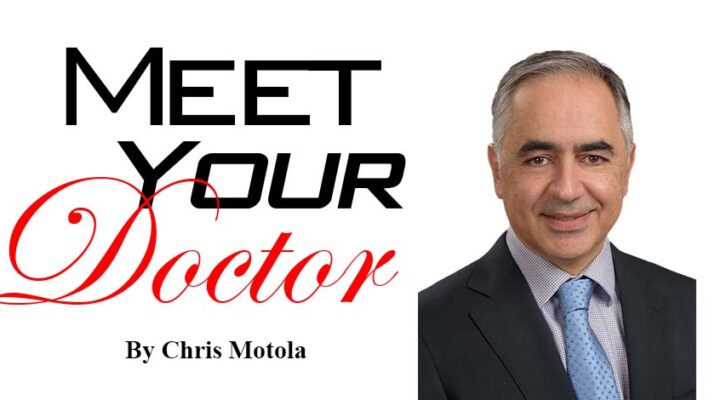Cardiologist at Great Lakes Cardiovascular discusses COVID-19 and how older patients with potential heart problems are negatively affected
By Christopher Motola
Q: When it comes to preventive heart care for elderly patients, how much of an impact have the lifestyle changes people have made to avoid COVID-19 had on heart health?
A: It’s certainly a concern. With COVID, a lot of people are staying home and not being seen when they need to be seen and assuming symptoms they’re having may be related to other things. We’ve seen some issues recently that arise from that. So it’s a challenge, obviously.
Q: What kinds of symptoms are we talking about here?
A: A lot of the time they’ll report just generally feeling tired. They assume it’s related to age when they could be having issues related to rhythm abnormalities, atrial fibrillation. A lot of these patients could have problems like that where they’re a little more tired, a little more short of breath, but don’t seek medical attention. And then the condition progresses. I see a lot of issues related to medications, confusion after going to multiple providers and getting different medications.
Q: Would you say that’s largely a logistical problem?
A: Yeah and in great degree reluctance to go to the hospital or to the doctor, for obvious reasons. Many of people are trying to ride it out to see if they get better or are just attributing it to old age. It can be very nonspecific in many cases. But they get sicker and sicker until they’re eventually seen in the hospital. Meanwhile, we could have intervened in the office maybe and we missed that opportunity. It’s a problem that’s gotten worse in the pandemic, but these issues—along with staying active—but it’s been an ongoing issue as well.
Q: Is it difficult right now to strike a balance between keeping seniors safe from COVID-19 and keeping them in good health generally?
A: Exactly, that’s a particular challenge. You try to minimize exposure because these are the patients who are most vulnerable to it. But at the same time, these are the patients who are at higher risk for other medical issues as well. In my case, it’s cardiac issues. So trying to find the right balance and not miss something while also protecting them is a challenge. I’m not sure what the right answer is.
Q: You mentioned patients confusing cardiac symptoms for natural effects of aging. How much should patients reasonably expect to decline as they age versus what’s the result of a disease process?
A: It’s a tough question to answer because it’s very individual. I see patients in their 80s, sometimes early 90s that are still maintaining a very independent and active lifestyle. For them, any decline in the level of functioning might be cause for concern and lead them to seek medical attention. Patients that have other comorbidities that accumulate over time may have limitations at an early age. They may become immobilized or dependent in their 70s. When they have a decline, they’re already very limited, so it might be harder to notice or appreciate that additional decline. To generalize, we should all expect a level of decline gradually after age 50 unless you really take measures to try to stop it. But again, it’s such an individual thing with genetic components. If you’re 60 and can’t walk two blocks, sometimes we’ll discover it’s just deconditioning, but it could also be a more serious issue. It’s really hard to generalize.
Q: There’s been some discussion of the effects of both COVID-19 and the COVID-19 vaccines on the heart. Have you seen any impact from either on your patients?
A: We have some data about the effects of the vaccines on younger patients where they could have an immune response that affects their heart. It has not, fortunately, been an issue with the elderly. They have a weaker immune response to the vaccines. The weaker response also means they tend to get less protection, but they don’t have the inflammatory issues that can come from an exaggerated immune response in younger patient. Definitely vaccination is highly encouraged for older adults and elderly in general. They have fewer risks and more benefits for that age group unless there’s a clear contra-indication for that specific patient. For the virus, age is a big factor when it comes to outcomes. The majority of patients who have a bad outcome are older patients. And it’s not just from age, but from the higher number of comorbidities that come with old age. If you have diabetes, renal dysfunction, the more of these issues you have, the more problems you’ll have. COVID isn’t just a respiratory virus. It affects other organs. It causes systemic inflammation. We’ll also see elderly patients who get it without that many issues because they don’t have that extreme autoimmune response to the virus that can be a problem in younger patients. It’s a complicated disease, unfortunately, but overall it’s a tougher one for older patients with multiple medical problems.
Lifelines
Name: Reza Banifatemi, M.D.
Position: Attending cardiologist at Great Lakes Cardiovascular
Special interest: Valvular heart disease, echocardiography, preventive cardiology.
Hometown: Tehran, Iran
Education: Medical degree from Pecs University School of Medicine, Pecs, Hungary (1997); internship and residency in internal medicine, Drexel University College of Medicine (2001-2004); fellowship in cardiology, Drexel University College of Medicine (2008-2011)
Affiliations: Kaleida; Buffalo General; Suburban Hospital
Organizations: American College of Cardiology; American Society of Echocardiography; American Society of Nuclear Cardiology
Family: Wife; two children
Hobbies: Travel, tennis, hiking, skiing

